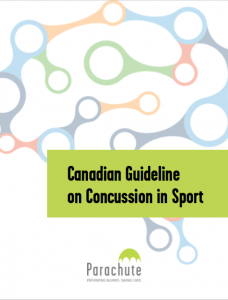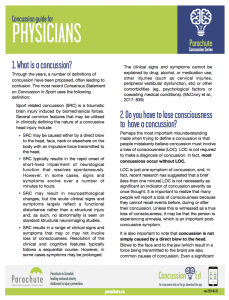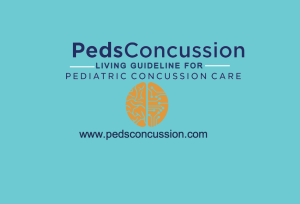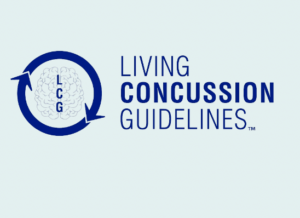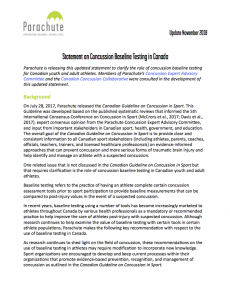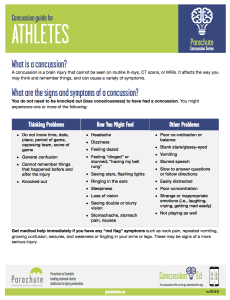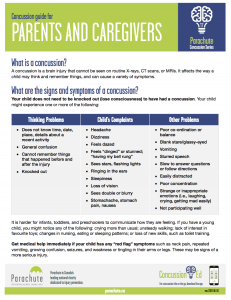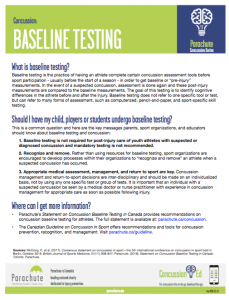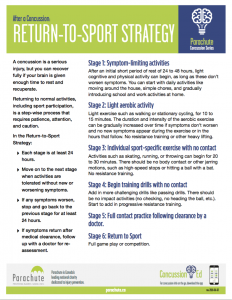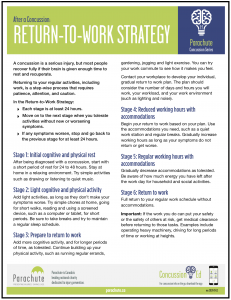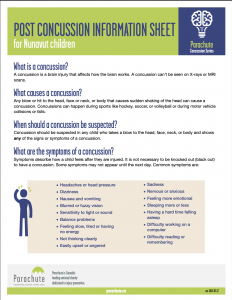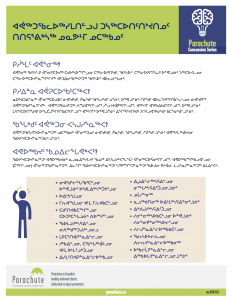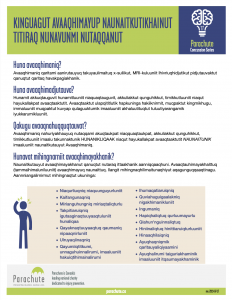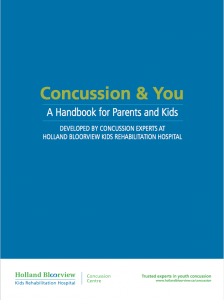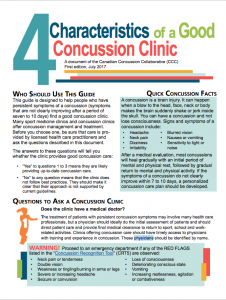Parachute has gathered the best in evidence-based information, training, assessment tools, documentation forms, guidelines and patient resources to help you recognize, manage and treat concussion.
Resources
Concussion learning for health professionals
Note: These learning resources are hosted by external organizations and Parachute cannot guarantee when these resources are updated.
-
Concussion Awareness Training Tool (CATT) for Medical Professionals
CATT (Concussion Awareness Training Tool) Medical Professionals is designed to provide medical professionals with the information they need to provide evidence-based care for their patients who have sustained a concussion. Accredited by UBC Continuing Professional Development, Faculty of Medicine. This course is accredited for MOC Section 3 credits
-
Online Concussion Course – University of Calgary, MOOC
This massive open online course (MOOC) demystifies concussion and explains how everyone can play a role in the prevention, identification, and management of this type of traumatic brain injury. The course also describes the revision and implementation of a concussion management protocol adapted to different environments.
-
Concussion Awareness Training Tool (CATT) for Women’s Support Workers
The Concussion Awareness Training Tool (CATT) is a program designed to provide people who work with survivors of intimate partner violence with the information they need to take an evidence-based approach in responding to and managing concussion.
Concussion assessment tools
-
Sport Concussion Assessment Tool 6 (SCAT6)
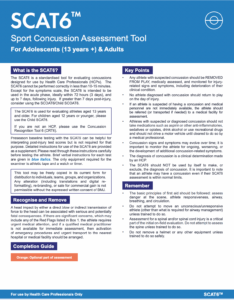
The SCAT6 is a standardized tool for evaluating concussions designed for use by licensed healthcare professionals. If you are not a healthcare professional, please use the Concussion Recognition Tool 6 (CRT6). The SCAT6 is to be used for evaluating athletes aged 13 years and older. For children aged 8 to 12 years, use the Child SCAT6.
-
Child Sport Concussion Assessment Tool 6 (Child SCAT6)
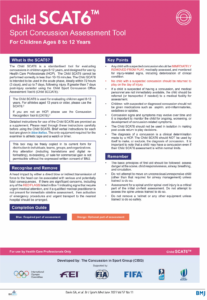
The Child SCAT6 is a standardized tool for evaluating concussions designed for use by licensed healthcare professionals. If you are not a healthcare professional, please use the Concussion Recognition Tool 6 (CRT6). The Child SCAT6 is to be used for evaluating children aged 8 to 12 years. For athletes aged 13 years and older, use the SCAT6.
-
Rivermead post-concussion symptoms questionnaire
This questionnaire allows individuals to rate the severity of their symptoms compared with before the concussion incident.
Concussion documentation forms
-
Medical assessment letter
A medical assessment letter should be provided to athletes diagnosed with a concussion, indicating a concussion has been diagnosed. Athletes that are determined to have not sustained a concussion must be provided with a Medical Assessment Letter indicating a concussion has not been diagnosed and the athlete can return to school, work and sport activities without restriction.
29.82 KB Word
-
Medical clearance letter
Before returning to full contact practice and game play, each athlete must provide their coach with a standardized Medical Clearance Letter that specifies that a medical doctor or nurse practitioner has personally evaluated the patient and has cleared the athlete to return to sport.
27.78 KB Word
Evidence-based concussion guidance
-
ACRM Diagnostic Criteria for Mild Traumatic Brain Injury
The Mild Traumatic Brain Injury Task Force of the American Congress of Rehabilitation Medicine (ACRM) Brain Injury Special Interest Group developed new diagnostic criteria for mild TBI through an evidence review and expert consensus process.
-
BC Concussion/Mild Traumatic Brain Injury Guideline
This provincial guideline was published by the Guidelines and Protocols and Advisory Committee, a joint committee between the Doctors of BC and the BC Ministry of Health. The guideline provides recommendations for the primary care assessment, diagnosis, and management of concussion/mild traumatic brain injury (mTBI) for patients of all ages.
-
Canadian CT Head Rule
his is a highly sensitive decision rule for use of computed tomography (CT) for patients with minor head injury.
-
Canadian Guideline on Concussion in Sport 2nd Edition 2024
-
Concussion guide for physicians
-
Falls Decision Rule
his is a clinical decision rule derived to safely exclude clinically important intracranial bleeding in older adults who present to the emergency department after a fall, without the need for a computed tomography (CT) scan of the head.
-
Living Concussion Guidelines: Guideline for Concussion & Prolonged Symptoms for Adults 18 Years of Age or Older
-
Living Guideline for Pediatric Concussion
-
Standards for post-concussion services and concussion clinics
-
Statement on Concussion Baseline Testing in Canada (2018)
-
CPS Position Statement: Sport-related concussion and bodychecking in children and youth: Evaluation, management, and policy implications
This statement from the Canadian Paediatric Society summarizes and highlights recent evidence and current best practice guidelines for managing concussion in children and youth, and re-examines the relationship between bodychecking in hockey and injury rates.
-
Concussion in para sport: the first position statement of the Concussion in Para Sport (CIPS) Group
This statement from the Concussion in Para Sport Group offers considerations for assessment, treatment and return to play after concussion in the para athlete.
Patient resources
-
Concussion Ed app
-
Concussion guide for athletes (2024)
-
Concussion guide for parents and caregivers (2024)
-
Concussion baseline testing fact sheet
-
Return-to-School Strategy (2024)
A four-step approach for a gradual return to cognitive activities and the learning environment.
371.73 KB PDF/UA
-
Return-to-Sport Strategy (2024)
-
Return-to-Work Strategy (2024)
-
The symptoms of a concussion
What are the symptoms of concussion? Find out by watching this video.
-
Post Concussion Information Sheet for Nunavut Children (English)
-
Post Concussion Information Sheet for Nunavut Children (Inuktitut)
-
Post Concussion Information Sheet for Nunavut Children (Inuinnaqtun)
Webinar
-
Canadian Guideline on Concussion in Sport, 2nd edition webinar (2024)
The Canadian Guideline on Concussion in Sport, 2nd edition was published in March 2024 with updated recommendations for the prevention, recognition and management of concussions. This webinar will provide an overview of key changes to recommendations and highlight resources available from Parachute and its partners for concussion policy and protocol development, training and education/awareness.
Presenter: Stephanie Cowle, Director, Knowledge Translation, Parachute
Additional resources
-
Concussion & You handbook (2016)
-
4 Characteristics of a Good Concussion Clinic (2017)
-
Abused & Brain Injured Toolkit
This toolkit provides information to educate about the impact of brain injury in women survivors of intimate partner violence, help identify survivors with possible brain injury, and help service providers support survivors with TBI.
-
Rowan’s Law: Information for health care providers
On this page of Government of Ontario website, learn about certain provisions under Rowan’s Law (Concussion Safety), 2018, that came into effect on January 1, 2022.
Injury Topics
Media
-
Link
Improving and standardizing concussion education and care: a Canadian experience
Future Medicine — October 24, 2018

